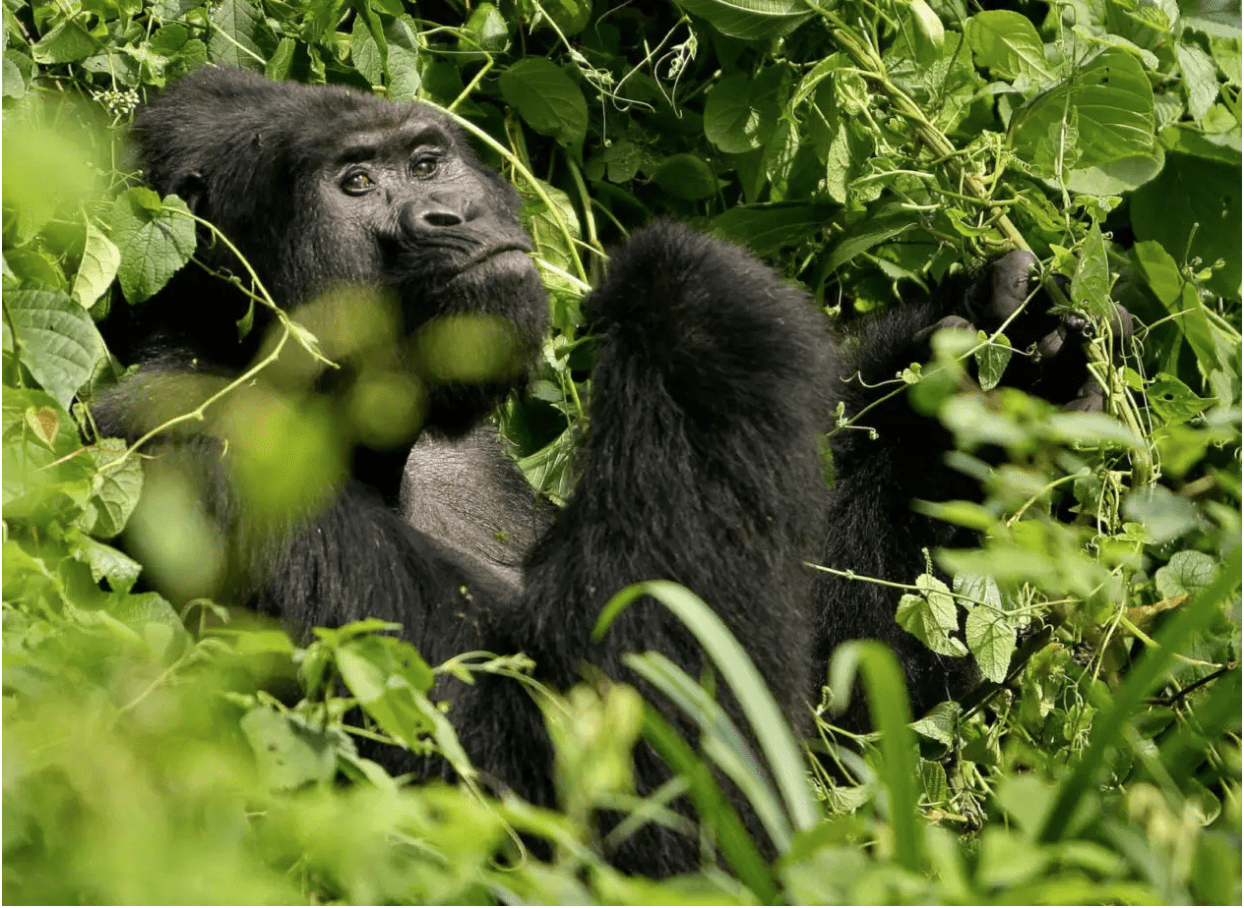
Toby Young: Some Western Visitors to Africa Seem to Value the Local Wildlife More Highly Than the People
04 May 2018
Toby Young: Some Western Visitors to Africa Seem to Value the Local Wildlife More Highly Than the People
[caption id="attachment_10601" align="aligncenter" width="1244"] Gorillas are gentle and placid, like oversized koala bears, says Toby Young (STUART PRICE/AFP/Getty Images)[/caption]
I’m currently gorilla-trekking in south-west Uganda, home to more than half of the world’s mountain gorillas, and having a wonderful time. The gorillas themselves are nothing like the way they’re depicted in popular culture – they are gentle and placid, like oversized koala bears.
As I crouched in a glade in the Bwindi Impenetrable National Park, watching a family play together, I realised the Planet of the Apes films have got it back to front. In real life, it’s the chimps that are aggressive and testy. Gorillas are stately and wise.
I’m not entirely comfortable with the whole concept of eco-tourism. There is no reason why a person cannot be a passionate conservationist and care deeply about the abject poverty of sub-Saharan Africa, but the two don’t always go hand-in-hand.
Some Western visitors to Africa seem to value the local wildlife more highly than the people. Insofar as they notice them at all, they see only confirmation of their own romantic fantasies, talking earnestly about how much more meaningful it is to lead a simple life, unencumbered by material possessions.
One person who is emphatically not suffering from the “noble savage” illusion is Dr Scott Kellermann, an expert on tropical diseases and public health, who first visited this part of the world in 2000. He had heard about the plight of the Batwa, forest people evicted from their homelands to make way for the gorilla parks, and wanted to see them for himself.
He carried out a survey and found that their health was not good. Their average life expectancy was 28 and more than a third of them died before reaching the age of five. Those are terrible stats, even by the standards of sub-Saharan Africa.
Gorillas are gentle and placid, like oversized koala bears, says Toby Young (STUART PRICE/AFP/Getty Images)[/caption]
I’m currently gorilla-trekking in south-west Uganda, home to more than half of the world’s mountain gorillas, and having a wonderful time. The gorillas themselves are nothing like the way they’re depicted in popular culture – they are gentle and placid, like oversized koala bears.
As I crouched in a glade in the Bwindi Impenetrable National Park, watching a family play together, I realised the Planet of the Apes films have got it back to front. In real life, it’s the chimps that are aggressive and testy. Gorillas are stately and wise.
I’m not entirely comfortable with the whole concept of eco-tourism. There is no reason why a person cannot be a passionate conservationist and care deeply about the abject poverty of sub-Saharan Africa, but the two don’t always go hand-in-hand.
Some Western visitors to Africa seem to value the local wildlife more highly than the people. Insofar as they notice them at all, they see only confirmation of their own romantic fantasies, talking earnestly about how much more meaningful it is to lead a simple life, unencumbered by material possessions.
One person who is emphatically not suffering from the “noble savage” illusion is Dr Scott Kellermann, an expert on tropical diseases and public health, who first visited this part of the world in 2000. He had heard about the plight of the Batwa, forest people evicted from their homelands to make way for the gorilla parks, and wanted to see them for himself.
He carried out a survey and found that their health was not good. Their average life expectancy was 28 and more than a third of them died before reaching the age of five. Those are terrible stats, even by the standards of sub-Saharan Africa.
 Gorillas are gentle and placid, like oversized koala bears, says Toby Young (STUART PRICE/AFP/Getty Images)[/caption]
I’m currently gorilla-trekking in south-west Uganda, home to more than half of the world’s mountain gorillas, and having a wonderful time. The gorillas themselves are nothing like the way they’re depicted in popular culture – they are gentle and placid, like oversized koala bears.
As I crouched in a glade in the Bwindi Impenetrable National Park, watching a family play together, I realised the Planet of the Apes films have got it back to front. In real life, it’s the chimps that are aggressive and testy. Gorillas are stately and wise.
I’m not entirely comfortable with the whole concept of eco-tourism. There is no reason why a person cannot be a passionate conservationist and care deeply about the abject poverty of sub-Saharan Africa, but the two don’t always go hand-in-hand.
Some Western visitors to Africa seem to value the local wildlife more highly than the people. Insofar as they notice them at all, they see only confirmation of their own romantic fantasies, talking earnestly about how much more meaningful it is to lead a simple life, unencumbered by material possessions.
One person who is emphatically not suffering from the “noble savage” illusion is Dr Scott Kellermann, an expert on tropical diseases and public health, who first visited this part of the world in 2000. He had heard about the plight of the Batwa, forest people evicted from their homelands to make way for the gorilla parks, and wanted to see them for himself.
He carried out a survey and found that their health was not good. Their average life expectancy was 28 and more than a third of them died before reaching the age of five. Those are terrible stats, even by the standards of sub-Saharan Africa.
Gorillas are gentle and placid, like oversized koala bears, says Toby Young (STUART PRICE/AFP/Getty Images)[/caption]
I’m currently gorilla-trekking in south-west Uganda, home to more than half of the world’s mountain gorillas, and having a wonderful time. The gorillas themselves are nothing like the way they’re depicted in popular culture – they are gentle and placid, like oversized koala bears.
As I crouched in a glade in the Bwindi Impenetrable National Park, watching a family play together, I realised the Planet of the Apes films have got it back to front. In real life, it’s the chimps that are aggressive and testy. Gorillas are stately and wise.
I’m not entirely comfortable with the whole concept of eco-tourism. There is no reason why a person cannot be a passionate conservationist and care deeply about the abject poverty of sub-Saharan Africa, but the two don’t always go hand-in-hand.
Some Western visitors to Africa seem to value the local wildlife more highly than the people. Insofar as they notice them at all, they see only confirmation of their own romantic fantasies, talking earnestly about how much more meaningful it is to lead a simple life, unencumbered by material possessions.
One person who is emphatically not suffering from the “noble savage” illusion is Dr Scott Kellermann, an expert on tropical diseases and public health, who first visited this part of the world in 2000. He had heard about the plight of the Batwa, forest people evicted from their homelands to make way for the gorilla parks, and wanted to see them for himself.
He carried out a survey and found that their health was not good. Their average life expectancy was 28 and more than a third of them died before reaching the age of five. Those are terrible stats, even by the standards of sub-Saharan Africa.